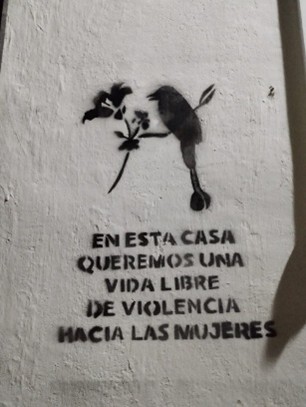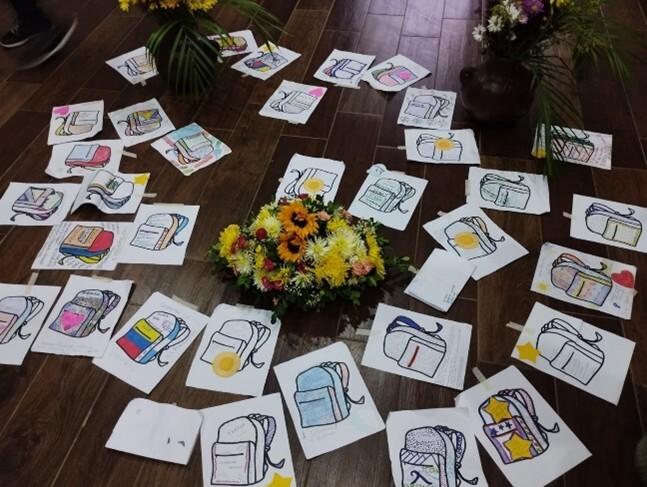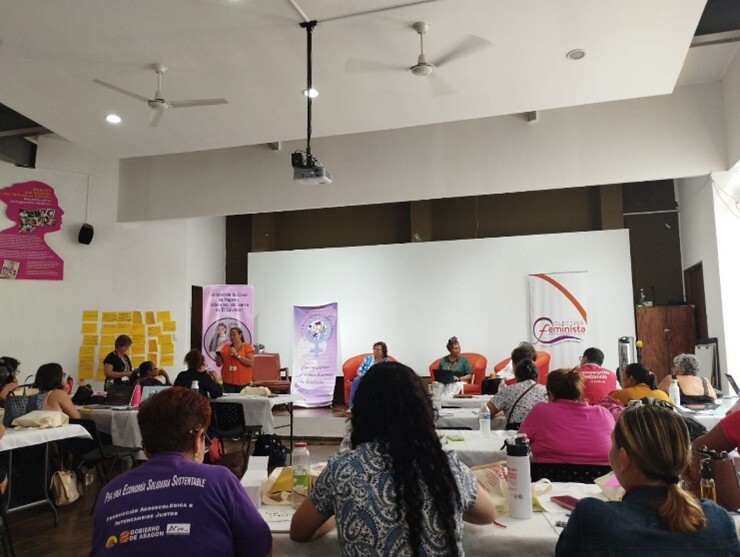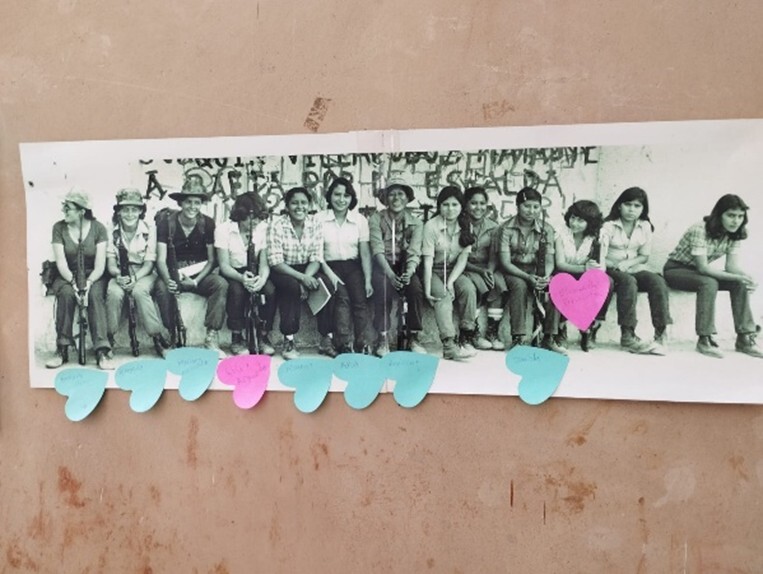FEATURE | 10 Jul 2025
Women shaping peace after war
How networks of former combatants are driving gender-transformative peace processes
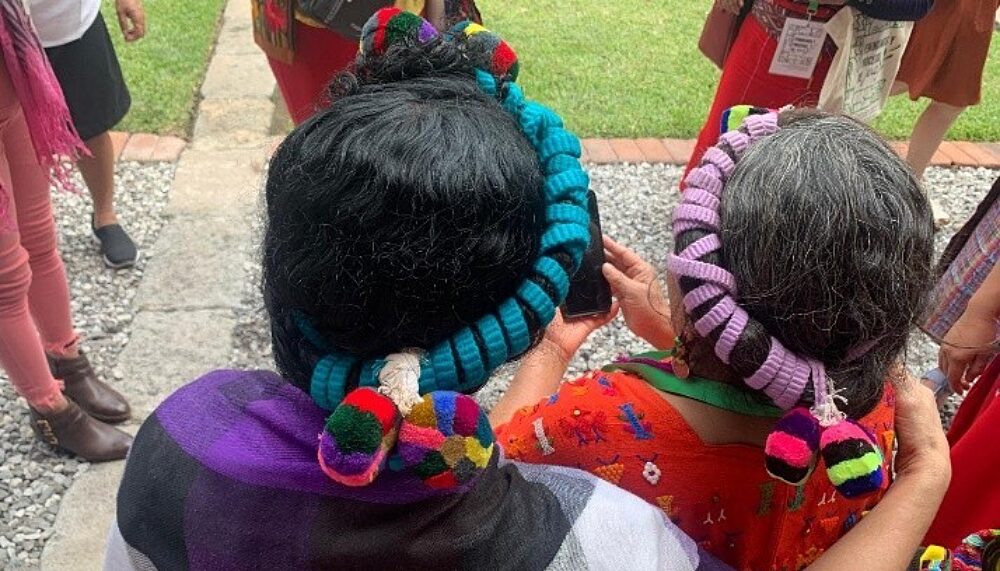
Long after peace deals are signed, women from resistance movements continue to lead. Their networks are spaces of healing, solidarity and transformation.
Once a peace agreement is signed, there is a tendency to consider the matter resolved, or at least, that is when many people stop paying attention to what needs to come next.
But for those who lived through war — especially women in resistance and liberation movements — the journey is far from over. This is why we offer long-term support before, during and after peace negotiations to women in and associated with resistance movements that stopped fighting and take on a peace leadership role.
Since 2021, we have partnered with the Association of Women Veterans of the Civil War in El Salvador (Las Veteranas) and the Feminist Collective for Local Development (La Colectiva Feminista) to support exchanges between 140 women ex-combatants from El Salvador, Guatemala and Colombia. These gatherings offer a vital space for women to reflect on their past as combatants and how it continues to shape their role in society and as peacebuilders today.
Forums for ex-combatants
In 2023, over 40 women war veterans from El Salvador and former guerrilleras from Colombia met to exchange lessons learned, challenges and recommendations regarding their transition to informal and formal politics.
The following year, we supported a follow-up meeting of over 100 women ex-combatants from El Salvador, Colombia and Guatemala—this time to focus on motherhood, memory and intergenerational dialogue.
We are a diversity of women, of coexistence, of thoughts. The fact that we can exchange with women from other countries helps us to gather the tools we need to continue this struggle.
Participant in Guatemala
Why networks matter
These gatherings offered former combatants a space to share experiences, exchange ideas, and engage in feminist and intergenerational dialogue. Discussions focused on recovering historical memory, the impact of interrupted motherhood during conflict, access to justice, women’s rights in war and post-war settings, and women's contributions to democracy and peacebuilding.
The collaboration is part of our support to women in resistance and liberation movements. Through the creation of a global peer-learning network for women members from active and recently demobilised resistance and liberation movements, we aim to enhance their negotiation skills, as well as bolster their capacity and opportunities for post-war leadership. In the face of stigmatisation and exclusion, women’s networks offer an opportunity for visibility, dignity and shared hope.
Many of the women who participated in peace processes have spoken openly about the deep sense of isolation they experienced, not only during negotiations, but also in the aftermath of demobilisation. While disarmament and reintegration are often framed as collective endeavours, the reality for many women ex-combatants is one of marginalisation.
When we women tell our stories, we do not only reclaim our history and re-create memory together, but we also heal collectively.
Participant in El Salvador
After laying down their arms, these women often feel excluded from post-conflict rebuilding efforts and are rarely recognised as political subjects in their own right. Instead, they face double stigmatisation—first, as former combatants and second as women and mothers who have defied traditional gender norms by taking up arms. There is also a lack of targeted reintegration programmes that recognise women’s distinct experiences in war and peace.
The transformative power of networks
It is precisely for these reasons that we believe so strongly in the transformative power of networks for women in and associated with resistance and liberation movements. These networks are spaces of solidarity, healing and (political) empowerment. Through collective organising, women can reclaim their voices, assert their agency and find strength in shared experience.
The difficulties of our peoples are identical and similar in our territories. The exchange has provided us with lessons, what is sought with the peace agreements seeks to silence the weapons but the problems continue.
Participant in Guatemala
Networks help rebuild identity and belonging, facilitate access to advocacy platforms, find common challenges and draw joint lessons and recommendations for policy influencing. Gatherings with peers who have been in a similar stage of the peace process help to find creative solutions to deadlock situations. For the women, it is useful to learn from the mistakes of others, identify challenges and develop strategies to ensure that their contributions to peace are never erased.
To learn more about the transition of women in and associated with resistance and liberation movements from Central and Latin America and how they continue to inspire one another, check out these two videos:
"Feminism and peace processes: Maternities, memories and intergenerational voices" in Antigua, Guatemala.
"Learning from our stories: Women's leadership in conflict transformation and post-war transitions" in El Salvador, Central America.
Media contact
You can reach the press team at:
+49 (0) 177 7052758
email hidden; JavaScript is required
